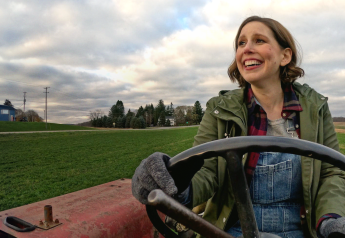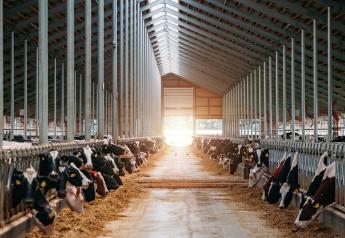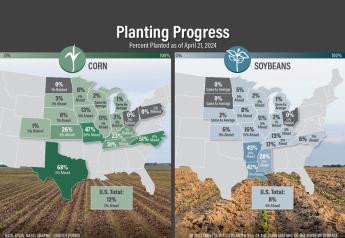Summer Calf Protocols

Source: Milk Products, LLC
As summer temperatures creep up over 90°F (32°C), heat stress can negatively impact calf health and performance. Heat stress causes increased respiration and body temperature, rapid dehydration and reduced immune system function. In addition, the calf’s maintenance energy requirement is elevated— similar to the effects of cold stress.
According to Dr. Dave Cook, technical service manager at Milk Products, LLC, "In cold weather, calves burn more energy to keep themselves warm, while in hot weather they burn more energy keeping themselves cool. Both calf growth and health can be negatively affected if heat stress is not managed."
Efforts should be made to identify and avoid heat stress in calves. If you see increased respiratory rates, open-mouthed breathing, decreased appetite and reluctance to move your calves may be suffering from heat stress. This summer consider the following tips to assure proper calf health and growth.
ENVIRONMENT
Reduce sun exposure — Use barns and hutches that do not allow sunlight to contact the calf. Eighty percent shade cloth is recommended on greenhouse barns and translucent hutches. A study conducted in Pennsylvania (Lammers, et al., 1996) showed daytime air temperatures inside translucent hutches were 3.6° – 5.4°F (2 – 3°C) higher than outside air. The study also noted higher calf body temperatures, higher respiration rates, higher water intake and lower feed intake in translucent hutches when compared to opaque hutches.
Improve air flow — Naturally ventilated buildings should have all vents completely opened, including ridge and eave vents, as well as sidewall curtains. Hutches should also have vents and doors opened, and the back end may be elevated using wooden or concrete blocks to improve ventilation. Hutches should also have enough space in between them to provide for air circulation.
Bedding — "The ideal bedding for calves during hot weather is a subject of debate," Cook said. "Inorganic sources such as sand or wood shavings offer advantages over organic sources such as straw. Also, sand and shavings do not insulate the calf as much and they don’t decompose so may reduce the fly population."
If the pens or hutches are on concrete or a hard dirt surface, sand or wood shavings may be a better choice than straw. No matter the season, the key is to keep the calves clean and dry. Choose the bedding material that best fits the housing and labor situation.
DIET AND MANAGEMENT
Free choice water — Constant access to free choice, fresh water is essential for summertime calf rearing. Calves exposed to heat stress can consume 3 – 6 gallons (11.4 – 22.8 liters) of water per day. If calves run out of water between feedings, a third water feeding may be necessary to prevent dehydration and assure proper health.
Calf starter — Freshness of calf starter needs to be closely monitored during hot weather to avoid mold growth or excessive fines. If possible, there should be a solid partition or enough space between the water and grain buckets to prevent carryover of water to the grain bucket.
Stresses — Perform stressful events in the early morning. Examples of stressful events include moving, grouping, vaccinating, dehorning and castrating. Evening temperatures seem cool, but animal body temperature lags behind ambient temperature by 4 – 6 hours; therefore, morning is the best time to conduct potentially stressful activities.
FLY CONTROL
Disease Control — Calf hutches are popular breeding grounds for flies. Flies complete their life cycle by laying eggs in fresh manure or wet, decomposing feed and manure. All of these conditions commonly exist in calf rearing facilities. Flies are directly involved in spreading bacteria that cause pinkeye in cattle and creating new infections in the immature udders of calves. This irritation of the teats through biting increases the potential risk and spread of mastitis in milking cows.
"They really are more than just a nuisance to deal with, as flies are known to do some pretty significant damage by decreasing milk production in lactating cows and average daily gains in growing cattle, as well as spreading disease," Cook said.
Main Types of Flies — There are four main types of flies to watch out for in a calf operation: Horn flies and stable flies cause significant economic damage through biting and blood feeding. Face flies and house flies are known for spreading disease. "All these fly species are a serious nuisance to cattle and people on and around the dairy operation," Cook said.
Not by Starter Alone — "Producers should consider incorporating a feed-through fly control product in both their calf starter and milk to get ahead of the flies—to break the fly life cycle," Cook said. "Starter alone won’t get the job done, as calves do not consume enough starter to have an effect until they are 3 to 4 weeks old. By having ClariFly® in the milk replacer or by using an add-pack in milk, like elim-A-fly,® producers can really get ahead of this summer stressor."







